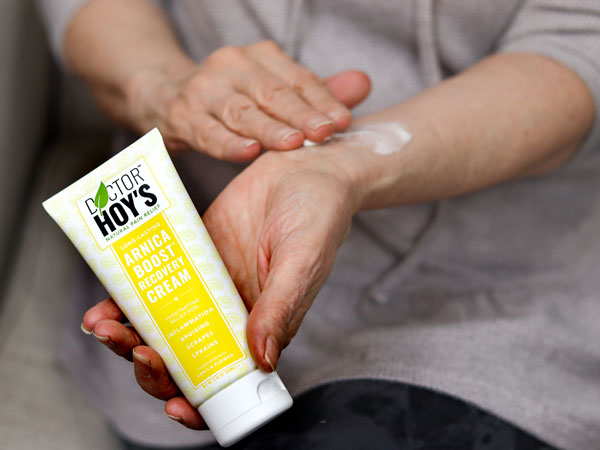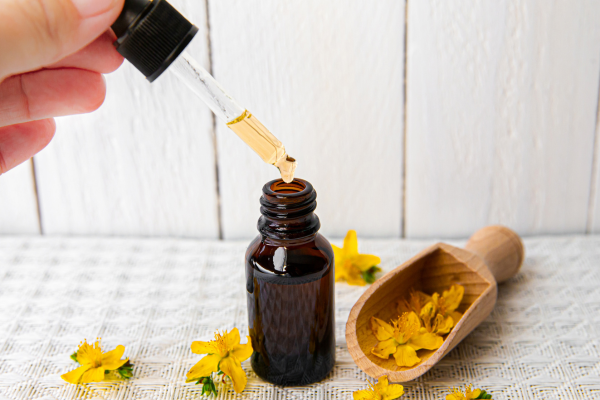Share

Natural Pain Relief: St. John’s Wort & Arnica Cream
St. John’s wort, or Hypericum perforatum, is a medicinal herb used for centuries to treat a variety of ailments. While often used as a natural anti-depressant, topical St. John’s wort also has many healing properties.
When combined with the power of arnica, like in Doctor Hoy’s® Arnica Boost Recovery Cream, St. John’s wort can help treat bruises, inflammation, muscle pain, and more.
Learn about the history and benefits of St. John’s wort as a topical plus how natural ingredients like the ones used in Doctor Hoy’s can help relieve your pain.
What is St. John’s wort plant?
In nature, St. John’s wort is a shrubby plant with small yellow flowers. Found in grasslands, forests, and by roadsides, it blooms in late June around St. John the Baptist Day, for which the plant is named.

Since the ancient Greeks, the flowers and leaves have been used in traditional European medicine to treat sciatica, insomnia, anxiety, burns, bite wounds, and more.
Scientists believe what makes the plant so effective is its active compounds that may have anti-inflammatory, antibiotic and anti-viral properties. Today, you can find and purchase St. John’s wort as capsules, tablets, tinctures, teas, oils, and in pain relief creams.
Can St John's wort be used topically?
The Committee on Herbal Medicinal Products (HMPC) accepts the use of topical St. John’s wort for treating symptoms of inflammation and to help heal minor wounds.
Pharmacological research says St. John’s wort oils and tinctures can help treat anything from bruises and muscle pain to eczema, though more trials are needed.
One example of St. John’s wort being used topically is in the management of plaque type psoriasis. Research and trials from 2012 and 2017 looked at the clinical effects of a St. John’s wort topical ointment on ten people with psoriasis.
Results of the trials showed symptoms like scaling and thickness were significantly lowered after the ointment was applied. In conclusion, applying St. John’s wort creams for psoriasis twice daily may help reduce symptoms in mild plaque-type psoriasis. (2,3)
Topical St. John’s Wort in Arnica Cream
St. John’s wort and Arnica montana are yellow flowering plants with centuries-old history in homeopathic medicine. Both work as natural anti-inflammatories, helping to soothe fatigued, achy muscles and promoting the healing of minor cuts, burns and abrasions. When used together, they can provide clean and effective relief.
Doctor Hoy’s Arnica Boost Recovery Cream uses St. John’s wort and arnica along with other natural, effective ingredients like MSM and aloe vera. When applied to the skin, it becomes a long-lasting nerve and muscle pain relief cream.

Arnica Boost works as an arnica bruise cream, a moisturizer for dry skin, and a topical for neuropathic pain. It can even help relieve sunburn, to which St. John’s wort is thought to increase sensitivity. You get all the benefits of St. John's wort and arnica plus others, like:
- Non-toxic & paraben-free, meaning zero carcinogens.
- Non-greasy, so it won’t stain and dries fast.
- Cruelty-free, so it is not tested on animals.
- Safe for adults and kids over two years old.
- Unscented with no sensation, so it is perfect for sensitive areas.
- Safe for repeated use and relief that lasts for hours.

What else is St. John’s wort used for?
Long studied for treating physical and mental ailments, St. John’s wort is one of the best investigated medicinal plants. Most research about the plant weighs its effectiveness at treating depression and how it interacts with other medications.
While there is not enough evidence to prove St. John’s wort successfully treats all these conditions, clinical research suggests it may be used for:
- Depression: In treating mild to moderate depression, St. John’s wort has fewer side effects than most prescription antidepressants and may be just as effective when used within a 12-week period.
- Premenopausal and Menopausal Symptoms: Evidence suggests that St. John’s wort could help relieve PMS symptoms like cramps or irritability. When used with black cohosh, it may help with mood and anxiety for women in menopause.
- Seasonal Affective Disorder: When used with light therapy, St. John’s wort may help amplify its effects and better improve mood for people suffering from seasonal affective disorder, or SAD.
- Nerve Pain: Thought more extensive research is needed, St. John’s wort has some evidence of helping treat nerve pain from neuralgia, rheumatism and arthritis.
- Skin Conditions: Antibacterial, analgesic, and anti-inflammatory properties give St. John’s wort its topical benefits. The plant can help relieve skin irritation and may stimulate tissue growth.

Other Important Information
Topical St. John’s wort in small enough amounts is unlikely to cause harm. Oral forms of St. John’s wort, like supplements, may have notable and dangerous side effects when mixed with certain medications. Always talk to your doctor before adding an herbal supplement to your diet, especially when mixing them with prescriptions.
Do not use St. John’s wort for depression alone or when you have symptoms of major depressive disorder. Anyone experiencing depressive episodes lasting longer than six months should seek medical treatment for more comprehensive care.
Use Doctor Hoy’s for Natural Ingredients, Guaranteed Relief
Doctor Hoy’s uses powerful, natural ingredients including St. John’s wort in our Arnica Boost Recovery Cream. The small amount, when combined with our other ingredients, has many benefits for a clean, safe, and effective muscle and nerve pain relief cream.
For fast-acting, deep pain relief from arthritis, back and joint pain, see Doctor Hoy’s Natural Pain Relief Gel.
References:
- Abdelrahman, K. M., & Hackshaw, K. V. (2021). Nutritional Supplements for the Treatment of Neuropathic Pain. Biomedicines, 9(6), 674. https://doi.org/10.3390/biomedicines9060674
- Hashemian, F., et al. (2017). The impact of topical Saint John’s Wort (Hypericum perforatum) treatment on tissue tumor necrosis factor-alpha levels in plaque-type psoriasis: A pilot study. Journal of Postgraduate Medicine, 63(4), 215. https://doi.org/10.4103/0022-3859.201423
- Najafizadeh, P., et al. (2012). The evaluation of the clinical effect of topical St Johns wort (Hypericum perforatum L.) in plaque type psoriasis vulgaris: A pilot study. Australasian Journal of Dermatology, 53(2), 131–135. https://doi.org/10.1111/j.1440-0960.2012.00877.x
- St. John’s wort Information. Mount Sinai Health System.
- St. John’s wort. (2023, August 10). Mayo Clinic.
- St. John’s wort (2020, October). NCCIH.
- St. John’s Wort (Hypericum Perforatum): Risks & Potential Benefits. (2022, November 29). Cleveland Clinic.
- Wölfle, U., Seelinger, G., & Schempp, C. (2013). Topical Application of St. Johnʼs Wort (Hypericum perforatum). Planta Medica, 80(02/03), 109–120. https://doi.org/10.1055/s-0033-1351019
